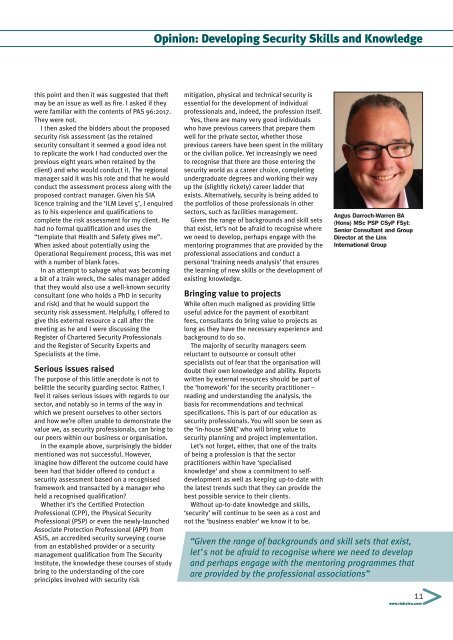RiskXtraDecember2018
You also want an ePaper? Increase the reach of your titles
YUMPU automatically turns print PDFs into web optimized ePapers that Google loves.
Opinion: Developing Security Skills and Knowledge<br />
this point and then it was suggested that theft<br />
may be an issue as well as fire. I asked if they<br />
were familiar with the contents of PAS 96:2017.<br />
They were not.<br />
I then asked the bidders about the proposed<br />
security risk assessment (as the retained<br />
security consultant it seemed a good idea not<br />
to replicate the work I had conducted over the<br />
previous eight years when retained by the<br />
client) and who would conduct it. The regional<br />
manager said it was his role and that he would<br />
conduct the assessment process along with the<br />
proposed contract manager. Given his SIA<br />
licence training and the ‘ILM Level 5’, I enquired<br />
as to his experience and qualifications to<br />
complete the risk assessment for my client. He<br />
had no formal qualification and uses the<br />
“template that Health and Safety gives me”.<br />
When asked about potentially using the<br />
Operational Requirement process, this was met<br />
with a number of blank faces.<br />
In an attempt to salvage what was becoming<br />
a bit of a train wreck, the sales manager added<br />
that they would also use a well-known security<br />
consultant (one who holds a PhD in security<br />
and risk) and that he would support the<br />
security risk assessment. Helpfully, I offered to<br />
give this external resource a call after the<br />
meeting as he and I were discussing the<br />
Register of Chartered Security Professionals<br />
and the Register of Security Experts and<br />
Specialists at the time.<br />
Serious issues raised<br />
The purpose of this little anecdote is not to<br />
belittle the security guarding sector. Rather, I<br />
feel it raises serious issues with regards to our<br />
sector, and notably so in terms of the way in<br />
which we present ourselves to other sectors<br />
and how we’re often unable to demonstrate the<br />
value we, as security professionals, can bring to<br />
our peers within our business or organisation.<br />
In the example above, surprisingly the bidder<br />
mentioned was not successful. However,<br />
imagine how different the outcome could have<br />
been had that bidder offered to conduct a<br />
security assessment based on a recognised<br />
framework and transacted by a manager who<br />
held a recognised qualification?<br />
Whether it’s the Certified Protection<br />
Professional (CPP), the Physical Security<br />
Professional (PSP) or even the newly-launched<br />
Associate Protection Professional (APP) from<br />
ASIS, an accredited security surveying course<br />
from an established provider or a security<br />
management qualification from The Security<br />
Institute, the knowledge these courses of study<br />
bring to the understanding of the core<br />
principles involved with security risk<br />
mitigation, physical and technical security is<br />
essential for the development of individual<br />
professionals and, indeed, the profession itself.<br />
Yes, there are many very good individuals<br />
who have previous careers that prepare them<br />
well for the private sector, whether those<br />
previous careers have been spent in the military<br />
or the civilian police. Yet increasingly we need<br />
to recognise that there are those entering the<br />
security world as a career choice, completing<br />
undergraduate degrees and working their way<br />
up the (slightly rickety) career ladder that<br />
exists. Alternatively, security is being added to<br />
the portfolios of those professionals in other<br />
sectors, such as facilities management.<br />
Given the range of backgrounds and skill sets<br />
that exist, let’s not be afraid to recognise where<br />
we need to develop, perhaps engage with the<br />
mentoring programmes that are provided by the<br />
professional associations and conduct a<br />
personal ‘training needs analysis’ that ensures<br />
the learning of new skills or the development of<br />
existing knowledge.<br />
Bringing value to projects<br />
While often much maligned as providing little<br />
useful advice for the payment of exorbitant<br />
fees, consultants do bring value to projects as<br />
long as they have the necessary experience and<br />
background to do so.<br />
The majority of security managers seem<br />
reluctant to outsource or consult other<br />
specialists out of fear that the organisation will<br />
doubt their own knowledge and ability. Reports<br />
written by external resources should be part of<br />
the ‘homework’ for the security practitioner –<br />
reading and understanding the analysis, the<br />
basis for recommendations and technical<br />
specifications. This is part of our education as<br />
security professionals. You will soon be seen as<br />
the ‘in-house SME’ who will bring value to<br />
security planning and project implementation.<br />
Let’s not forget, either, that one of the traits<br />
of being a profession is that the sector<br />
practitioners within have ‘specialised<br />
knowledge’ and show a commitment to selfdevelopment<br />
as well as keeping up-to-date with<br />
the latest trends such that they can provide the<br />
best possible service to their clients.<br />
Without up-to-date knowledge and skills,<br />
‘security’ will continue to be seen as a cost and<br />
not the ‘business enabler’ we know it to be.<br />
Angus Darroch-Warren BA<br />
(Hons) MSc PSP CSyP FSyI:<br />
Senior Consultant and Group<br />
Director at the Linx<br />
International Group<br />
“Given the range of backgrounds and skill sets that exist,<br />
let’s not be afraid to recognise where we need to develop<br />
and perhaps engage with the mentoring programmes that<br />
are provided by the professional associations”<br />
11<br />
www.riskxtra.com>

















